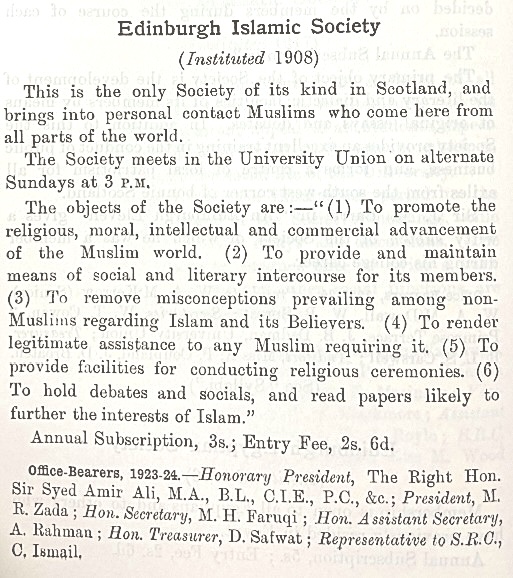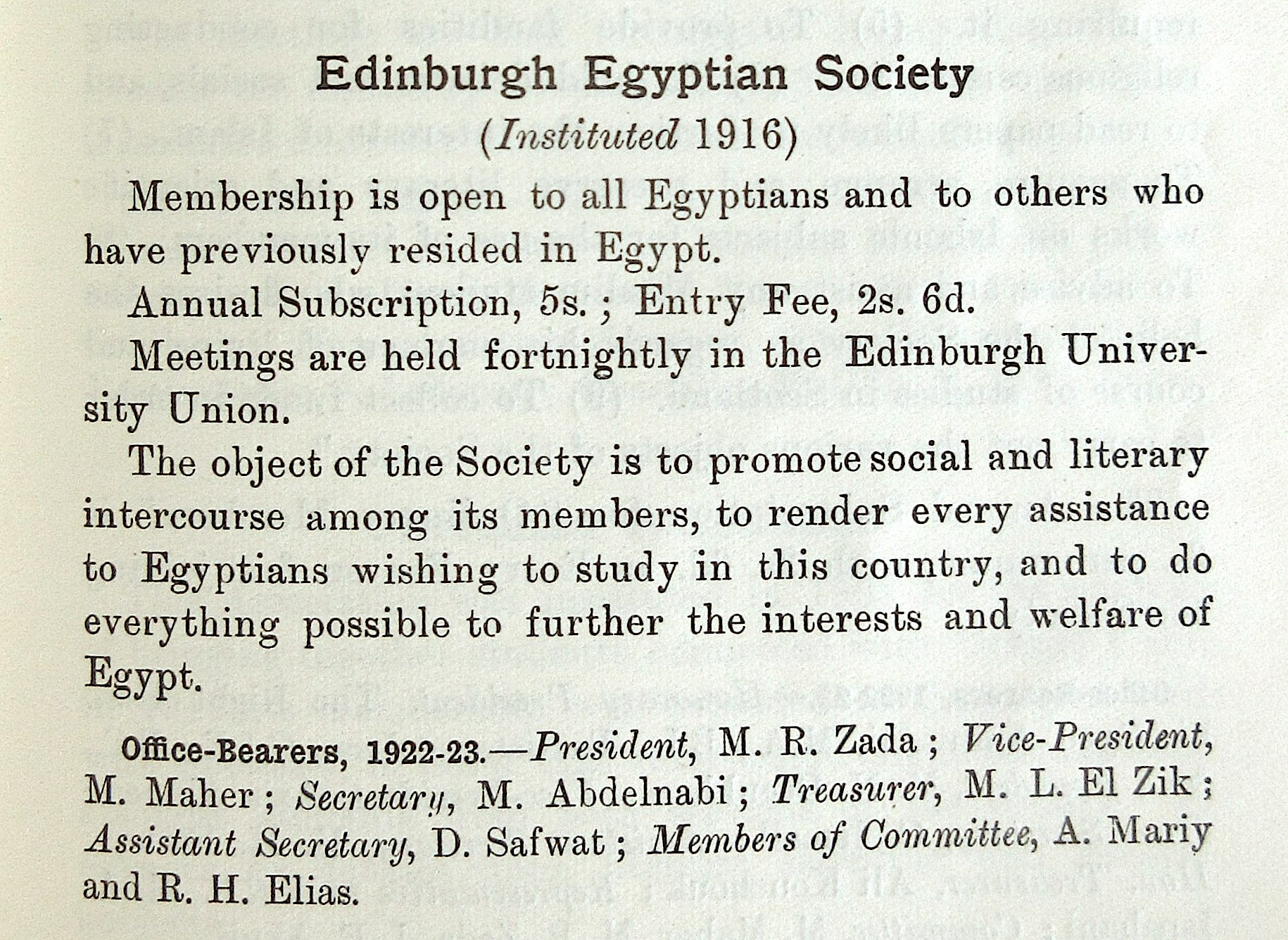As a Western institution of higher education, the University of Edinburgh attracted students from the Middle East who brought not only their intellectual potential and aspirations for learning but also their collective political, social and cultural views that they expressed and disseminated in ways that would seek to challenge some social and political issues both for the institution and themselves. At times they no doubt worked with Edinburgh academics with their cultural knowledge and language abilities.
The Middle Eastern Student Body
Records indicate that students from Turkey and Persia attended the University as early as 1846, with several Egyptian students matriculating during the 1850s. This was part of a growing internationalisation of the student body that in time saw the establishment of a number of international student associations. The Indian Association was formed in 1883 but others soon followed. Over time their presence at the University, as student societies and individuals, would raise some challenging social and political questions.

Edinburgh Islamic Society (EIS)
In 1908 the Edinburgh Islamic Society (EIS) was constituted by twenty-four Arab, Egyptian, Indian, Persian, Syrian, Turkish and Afghan students ‘to promote the religious, social, moral, intellectual and commercial advancement of the Muslim world’. This broad programme soon took on a political character. One of the earliest EIS events hosted a dinner at the Caledonian Station Hotel for the Egyptian nationalist leader, Muhammad Farid, who spoke critically of the British occupation of Egypt. In the following years the anticolonial stance of the Society manifested itself in resolutions condemning the Italian invasion of Libya in 1911, criticism of the immigration laws in Natal, and protests against French ‘outrages’ in Syria during the 1920s. Fundraising efforts were also organised for the Ottoman Navy (1911) and the Red Crescent Society in Istanbul (1912). Yet other occasions prompted protest by the EIS on religious issues, such as the great exception taken to comments made on Islam during the World Missionary Conference held in Edinburgh (1910).
 Edinburgh Egyptian Society
Edinburgh Egyptian Society
In 1916 the number of Egyptian students at Edinburgh was sufficient to support the establishment of a separate society, the Edinburgh Egyptian Society (EES), which was open to all Egyptians and met fortnightly on Saturday afternoons during the academic year. Pledged ‘to promote social and literary intercourse among its members, to render every assistance to Egyptians wishing to study in this country, and to do everything possible to further the interests and welfare of Egypt’, the EES became a prominent political voice in the years immediately after World War I, when the matter of Egyptian and British relations was heavily under public discussion. Following the 1919 Revolution in Egypt, the Society issued a number of statements in the British national press supporting the nationalist Wafd of Sa’d Zaghlul that called for Egyptian independence and an end to the British occupation. In this campaign against imperialism, the EES hosted visiting Egyptian politicians and activists, and worked with other student societies, such the Egyptian Indian Association. Later in the 1930s, the issue of Palestine would receive attention in the pages of student publications and in the local press to which both University students and staff contributed.
Edinburgh Students in the National Press:
‘Saad Zagloul Pasha arrives in London’, The Scotsman 7 June 1920
Saad Zagloul Pasha, the head of the Egyptian Nationalist Delegation to this country, whose object is to meet the British Premier and Lord Milner for the purpose of urging complete independence for Egypt, with guarantees for British interests, arrived in London on Saturday evening. Other members of the Delegation were already in London and, the Press Association understands, had entered upon the preparations necessary to their mission.
After a short stay in Paris Saad Zagloul Pasha came to London by the boat train reaching Victoria station about 6:45 PM. Here his arrival was awaited by a body of about 200 Egyptians, mostly representatives of the Egyptian Association of Great Britain and Ireland of the Egyptian Club, and of the Egyptian colony in London. Many of them were students from the Universities of Manchester, Birmingham, Edinburgh, Glasgow, Liverpool, and Ireland, and the main body was joined by several Sudanese who, it was stated, had travelled especially from the Sudan to join in the welcome to the Egyptian Nationalist Leader. […]
‘Professor Ebaid on the Egyptian Question’, The Scotsman 11 October 1921
Under the auspices of the Edinburgh Egyptian Society, a lecture was given in Edinburgh last night on “The Egyptian Question” by Professor William Ebaid, who is a member of the Egyptian Delegation. Professor Barger, Edinburgh, presided. The lecturer opened his address with an outline of the claims of the Egyptians to independence and referred to the sixty-four promises of Great Britain to evacuate Egypt. He wished, he said, to ask the British public to keep the dignity of the British word. The Egyptians had the ability to uphold their own as one of the progressive nations and they were willing to obtain freedom at any cost. The Milner Scheme, he said, was nothing but a sham independence and a disguised protectorate. Zaghloul Pasha, he maintained, was the only representative of the Egyptian nation, and with him only could a lasting peace be made. The Chairman, in thanking the lecturer for his address, said he was pleased to have learned more about the Egyptian question, which he added was largely misrepresented in this country.
‘An Edinburgh Protest’ The Scotsman 3 Nov 1925
The Edinburgh Islamic Society yesterday sent a telegram addressed to the President of the Council of the League of Nations, protesting against “the recent outrages committed by France in Syria and requesting the League to take measures to stop the wanton destruction of life and property.”